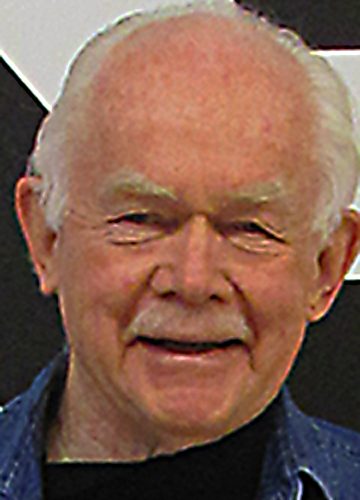A Nightmare

There is a crack, a crack in everything, that’s how the light gets in. Leonard Cohen in Anthem.
It was a terrifying experience. A nightmare worse than anything Stephen King has come up with to scare the bejesus out of me.
Through vestigial body memory here is what I’ve been able to reconstruct of my own nightmare that has morphed into other forms of fear. And from something I’ve just read that helps me to understand more about the day I was unexpectedly was freed from the darkness that I had been sequestered in for over half a year.
Then came the day. The day I was thrust out of my dark enclosure into a blinding light I had never before experienced in my life up to that moment. I was nearly breathless with fear. Then someone slapped me. Hard. And my nightmare began.
This all happened on February 12, 1936, the day I was born.
“We come into a world that we are not ready to cope with. Having been provided with everything you needed in your life within your mother’s womb, you come out terribly soft and vulnerable. We lie there helpless, waiting for others to provide what we need – food, comfort and reassurance.” So writes Martha Nussbaum in her brilliant book The Monarchy of Fear. Nussbaum is a philosopher and Ernst Freund Distinguished Service Professor of Law and Ethics at the University of Chicago where she is jointly appointed in the law school and the philosophy department.
Nussbaum continues: “After the soothing undulation of life in the womb, its automatic nourishment and unproblematic excretion, there is suddenly a violent separateness, the slap of cold air, and a painful solitary powerlessness.”
Everyone. Everyone in America, everyone in the world, has had the same experience. “…this horror story,” Nussbaum writes, “is also the unremarkable daily life of every human baby.” Unlike all other animals who either soon after birth learn to move quickly or die, “human beings alone survive that helpless condition.” With a lot of help. Help we need right now to get through the coronavirus pandemic. Help we need to get through the economic aftermath. Help we need to get through Donald Trump’s first term. Then even more help that we all will need to mitigate the slower, but more stealthiest and deadly climate crisis arriving on the heels of Covid 19.
“When we are born, we are powerless” writes Nussbaum. “Our only option for survival to get what we want, what we need, is to ‘use’ other people. We are completely narcissistic human beings. How do infants overcome the narcissism of fear? We do not survive it,” Nussbaum says, “without being formed and deformed, by it. Fear, genetically first among the emotions, persists beneath all and infects them all, nibbling around the edges of love and reciprocity.”
Aristotle, who was a great biologist, theorized a great deal about the emotions of animals, and believed that the emotions of all animals, not just humans, feel fear of something bad “out there” that may harm them. Nussbaum cites the work of neuroscientist Joseph LeDoux in his book, The Mysterious Underpinnings of Emotional Life, who says the early fright conditioning has lasting effects on the organism and is very difficult to undo.
“Our bleak narrative must now become more subtle,” Nussbaum writes, “because we know that we are much more than that imperious baby, forcing others to do its bidding. And thinking about how we extricate ourselves from infantile narcissism might help us think about how to extricate ourselves from our very narcissistic and anxiety-driven political moment.”
Nussbaum says that the bonding between parents and children that is essential for our survival requires at least limited reciprocity. “Parents,” says Nussbaum, “need to feel that they get some return for all their investment – a reason why care for children with profound emotional disabilities (severe autism, for example) is agonizingly difficult. In prehistory,” she writes, “such children would probably have been abandoned.”
Jean-Jacques Rousseau, a major intellectual architect of the revolutionary anti-monarchical politics of the 18th century, wrote that fear is the emotion of an absolute monarch, who cares about nothing and nobody else. Nussbaum writes, “the kings of France could not have been compassionate for the people they rule, since they could not imagine any type of common world, or reciprocity, with them.”
This so describes Donald Trump. The only reciprocity the president practices is negative and directed at those who do not support him. It leads one to wonder if he received the “essential” parental bonding as a boy and young man sufficient to instill the self-awareness and personal confidence to overcome his constant narcissistic need for approval.
In his autobiography The Art of the Deal written by journalist Tony Schwartz, Trump said “I was never intimidated by my father… I stood up to him, and he respected that.” Those words don’t necessarily equate to a close relationship, but Trump doesn’t appear to be too close to anyone. In an interview with The Guardian, friends of Trump and his father described the pair’s relationship as having a “very strange” dynamic. When interviewed, one woman recalled that they never seemed to listen to anything the other one said. “They talked right past each other.” Does that sound familiar?
Trump biographer Schwartz called writing The Art of the Deal his “greatest regret in life, without question,” and that the work be “recategorized as fiction”.
Reporter Julia Mullaney wrote that when Trump’s father died in 1999, his quote in his father’s New York Times obituary “was not what you’d expect. He directed his words toward his father’s lack of expanding real estate into Manhattan. ‘It was good for me,’ he said. ‘You know, being the son of somebody, it could have been competition to me. This way, I got Manhattan all to myself!’ For Trump, money makes the world go ‘round. A sense of compassion, even for his own father, never seemed to be there.”
The lack of compassion for anyone is one of Trump’s defining characteristics. Another characteristic commonly used to define Donald Trump is narcissist. Perhaps he is an unrecovered narcissist from birth as Nussbaum describes as an infant’s essential option for survival.
Nussbaum goes on to describe a narcissist as “someone who is intensely focused on themselves – often to the point of self-adoration – and who belittles others. They spend an inordinate amount of time listing their accomplishments (as proof of their greatness) and it is impossible to have a balanced conversation with them as they invariably pay cursory or no attention to what you say.”
On the rare occasions, if they actually do listen, it is because they are planning a strategy to redirect conversations back to them. There is no doubt about it: Mr. Trump is a textbook example of a person with Narcissistic Personality Disorder. Psychologists have no trouble diagnosing him with that condition. Actually, you do not need to be a trained psychologist to “get it” that the president is a narcissist. Much as he likes to think he is unique, he is not. Trump is simply the most egregious example of so many powerful men who lack compassion and act accordingly. This would include Senate Majority Leader Mitch McConnell.
“It is better to be feared than loved, if you cannot be both” wrote Niccolo Machiavelli. We don’t know whether Donald Trump’s personality falls under the umbrella of personality disorder. Saying someone has a personality disorder (narcissism or other characteristics) tells us nothing about the cause for such development and the mechanism people use to maintain such traits. And this where it gets interesting.
Personality disorders develop as a result of life experiences, not because of genetic vulnerability. It is very difficult to claim with certitude where those negative experiences originate from but we do know how the relationship we have with significant people in our lives dramatically shape our perception of the world and ourselves. It makes me wonder if Donald Trump was able to overcome his early fright conditioning. Or is he (and are we) experiencing its lasting effects?
Nothing disturbs Mr. Trump more than someone questioning or challenging his power and dominance. This is, I think, because there is deep within Trump a feeling that does not think he is great. If one could peel back the layers of defense that armor the president I think you would find a very insecure child hiding somewhere inside. But that part is so hidden from his own awareness that it is almost impossible for anyone else to see.
This is not an original observation. Many qualified professional psychologists have come forward to observe the same thing.
Trump’s tweets and comments have been, and continue to be self-aggrandizing, demeaning, racist and false. It should come as no surprise why so many people despise him. It is because of what he shows us about himself each and every day. It is not, as his defenders like to charge, because his critics suffer from the “Trump Derangement Syndrome.”
The president, it is said, does not sleep much at night. I wonder if, like Scrooge, he is being kept awake by voices in his own personal nightmare. Freud and Carl Jung seemed to have shared a belief that people frequently distressed by nightmares could be re-experiencing some stressful event from the past. Whatever the case, Trump’s past became a prelude to the dark times we all find ourselves living in today. My nightmare is that there will not be enough people desperate to emerge from the darkness on November 3 to vote to let the light shine on America once again.







